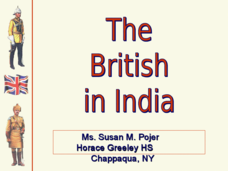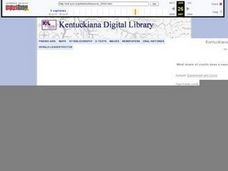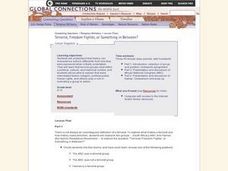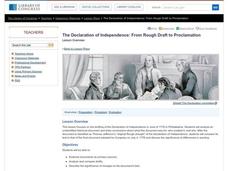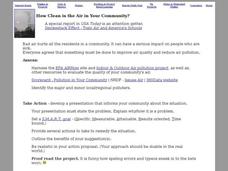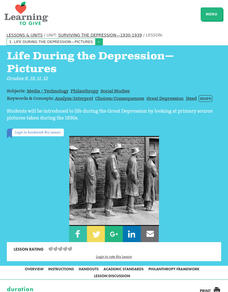Curated OER
The British in India
While this presentation is not text heavy, it does provide an outline of the British rule in India. It is image-rich and great to keep a lecture on track, However, it is lacking in text. If your lecture is complete and needs only a...
Curated OER
Federal Court Systems and Court Cases
Ninth graders investigate the basis for the Common Law Tradition. They examine the organization of the Federal Court System and students identify the various sources of the American Law.
Curated OER
Tic Tac Lesson: Learning About America
General information about America is covered in this presentation. There are 4 topical slides, our capital, important places, important people and our country's holidays. This PowerPoint would be a great discussion starter or as...
Curated OER
Social Studies: The Lewis and Clark Trail Today
Students locate present-day towns along the Lewis and Clark Trail and compare them to towns in 1800, 1900, and 2,000. Working in groups, they conduct Intenet research to locate the wons along the trail and research their history and...
Curated OER
Separate is Not Equal: Brown v. Board of Education
Students analyze photographs that feature segregation. In this human rights lesson, students examine photographs of a segregated movie theater, a Ku Klux Klan gathering, a segregated business sign, and an illustration from "Harper's...
Curated OER
Bootleg Bytes
Students conduct background research to explore the positions of different groups involved in the digital piracy debate, then participate in a fishbowl discussion that seeks to find a consensus on the issue.
Curated OER
Drums of War
Students research the political climate prior to major American wars of the past, then reflect on the current call for power to confront Iraq. They create posters using newspaper articles and headlines to highlight the major opinions of...
Curated OER
Fight For Your Rights
Learners explore issues related to tenants' rights in New York City, or in the area in which they live. They then create informational pamphlets designed to inform tenants of their rights.
Curated OER
A Dictionary of Democracy
Students create dictionary of terms for citizens of a democracy, using events and biographies from both their state's history and U.S. history.
Curated OER
My Brother Sam is Dead: A study of the Revolutionary War
Fifth graders complete an analysis of the Revolutionary War through literature. After "My Brother Sam Is Dead," students create a time capsule containing items that would be relevant during the Revolutionary War. They identify key...
Curated OER
Terrorist, Freedom Fighter, or Something in Between?
High schoolers identify that history can characterize actions differently from how they were perceived when initially undertaken. Then they identify that terrorist groups exist within a political, cultural, and historical context, and...
National First Ladies' Library
How a Bill Becomes a Law
High schoolers engage in the democratic process and to learn how a bill become a law. Then they write a bill they would like as law in their classroom. Students also form committees that will review the list of bills to determine if they...
National First Ladies' Library
Where's Amelia?
Learners examine the life and accomplishments of Amelia Earhart and her status as a role model for women. After researching Earhart, they select another person they think is courageous and write a dialog between the two heroes as if they...
Curated OER
Does Free Speech Exist in School?
Students examine their own First Amendment rights as students. They read and discuss a news article, discuss the Supreme Court case Frederick v. Morse, take an online quiz and conduct Internet research, and create a brochure outlining...
Curated OER
Benjamin Franklin- Philanthropist
Learners research and read a profile of Benjamin Franklin. In this philanthropic lesson, students research the projects of Benjamin Franklin and determine which were philanthropic, which were governmental and which were business...
Curated OER
The Declaration of Independence: From Rough Draft to Proclamation
Students discover the purpose of the Declaration of Independence. In this colonial America instructional activity, students compare the original draft by Thomas Jefferson to the final draft of the Declaration of Independence.
Curated OER
How Clean Is the Air in Your Community?
In this how clean is the air in your community worksheet, students assess the air quality, identify polluters, create an action plan, develop a presentation, evaluate it. This page has many links to helpful Internet resources.
Curated OER
Slavery In America During the Civil War
Learners continue their examination of the Civil War. In groups, they use the internet and print sources to research the life of a slave. For each slave researched, they copy quotes and other information from primary and secondary...
Curated OER
The Constitution: Drafting a More Perfect Union
Students analyze the U.S. Constitution. In this U.S. History lesson, students explore the purpose of the Constitution, as well as who was involved in its creation.
Curated OER
Surviving the Depression- 1930-1939 Lesson 1: Life During the Depression- Picture
High schoolers examine and analyze primary source documents and pictures from the Great Depression Era. They consider ways in which the suffering of the Era could have been alleviated.
Curated OER
EX-SLAVE NARRATIVES
Students read narratives of ex-slaves and then in groups write and act in their plays.
Curated OER
Bringing the Past to the Present
Second graders work in pairs and read a primary source artifact. They create a PowerPoint slide that will be part of a "museum" presentation for the rest of their class. Students select artifacts from a group of digitalized artifacts...
Curated OER
Social Studies: How Did Native Americans Live?
Fifth graders examine Edward Curtis' photographs and Robert Griffing's paintings to analyze Native American culture. They present research information on specific tribes, using the photos and paintings to uncover information about the...
Curated OER
Create a Timeline
Students make a timeline from the late 1800's to 2000 to mark significant inventions.


